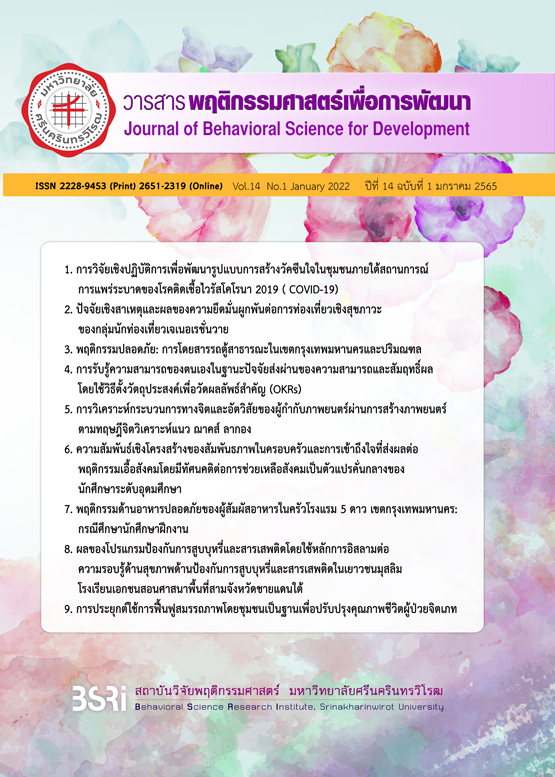Food safety behavior of food handlers in the kitchen of a 5-star hotel in Bangkok: A case study of interns
Keywords:
food handler behavior, food safety, food sanitation, hotel kitchenAbstract
The aims of this study were (1) to study food sanitation behavior, (2) to study food sanitation behavior factors, and (3) to study the relationship of factors affecting food sanitation behavior for food safety. The questionnaire was used and answered by 217 food handlers who are interns in food management related programs. The result showed that the majority of food handlers had knowledge of food sanitation, especially what should be done or must be done to keep food safe and were encouraged by a command or a role model of their supervisors. The majority of food handlers had the strongly responsible attitude towards adhering to overall food sanitation practices. A positive correlation was found between the factors of knowledge, social support, and attitude of food handlers and the behavior of food sanitation at the hotels. From a multiple regression analysis, it was found that the attitude factor affected the behavior of food handlers the most, followed by knowledge and social support, respectively, at a predictive ability of 43.7%. As such, if the hotel operators or the educational institutions desire to develop the potential of food handlers, they should first promote a positive attitude towards food sanitation, and then provide the food handlers with regular training or education sessions on food sanitation as needed for their functional levels. Moreover, the hotel operators should have in place a food safety policy and relevant facilities to accommodate more efficiency of work performance.
References
Department of Disease Control. (2021). phayākō̜n rōk læ phai sukkhaphāp rāi sapdā [Weekly prognosis and health disaster]. https://ddc.moph.go.th/brc/news.php?news=17033&deptcode=brc
Griffith, C. J., & Clayton, D. (2005). Food safety knowledge, attitudes, and practices of caterers in the UK. In B. Maunsell, & D. J. Bolton (Eds.). Restaurant and catering food safety. Teagasc.
Haider, S., Fatima, F., Bakhsh, K., & Ahmed, M. (2019). Effect of intervention on employees’ intentions to use environmentally sustainable work practices: A field experiment. Journal of Environmental Management, 248, 109334.
Ko, W. (2011). Food Sanitation Knowledge, Attitude, and Behavior for the University Restaurants Employees. Food and Nutrition Sciences, 2, 744-750.
Leelakkhanaweera, S. (2020). phǣn thurakit kān čhamnāi ʻuppakō̜n čhat līang bǣp khrop wongčhō̜n [Business Plan for Catering Equipment Supply]. Graduate School, Bangkok University.
Lunkam, P. (2564). nǣonōm thurakit / ʻutsāhakam pī sō̜ngphanhārō̜ihoksipsī - sō̜ngphanhārō̜ihoksiphok : thurakit rōngrǣm [Business/Industry Outlook 2021-2023: Hotel Business]. https://www.krungsri.com/th/research/industry/industry-outlook/Services/ Hotels/IO/io-hotel-21
Nantapong, N., & Natawin, P. (2013). māttrathān kān sukhāphibān ʻāhān nai rōngrǣm [Food sanitation standards in hotels]. Agricultural Cooperatives Association of Thailand: Bureau of Food and Water Sanitation, Department of Health, Ministry of Public Health.
Pender, N. J., Murdaugh, C. L., & Parsons, M. A. (2006). Health Promotion in Nursing Practice (5th ed.). Pearson.
Puttarak, P., & Chatraphorn, S. (2010). khwāmrū Thatsanakhati læphrưttikamkānsukhāphibānʻāhānkhō̜ngphūpra kō̜pʻāhānnairōngrǣm Čhangwatphuket [Knowledge, Attitude and Food Sanitation Behavior of Chefs in Phuket Hotels]. Kasetsart Journal of Social Science, 31(1), 67-81.
Roger, E. M., & Storey, J. D. (1987). Communication campaign. In C. Berger & S. H. Chaffee (Eds.). Handbook of communication science. Sage.
Saksri, Y. (2017). khwāmsamphan rawāng khwāmrū thatsanakhati læ kān patibat nai kān pō̜ngkan kān titchư̄a tamnǣng phātat nai raya phātat khō̜ng phayābān hō̜ng phātat [Relationship between knowledge, attitude, and practice towards prevention of surgical site infection during intraoperative period among perioperative nurses] (Master’s thesis), Songkla University.
Thaithae, P. (2003). Patčhaithīsongphontō̜phrưttikamkānsukhāphibānʻāhānkhō̜ngphūbō̜rikānʻ
āhānnailǣngthō̜ngthīaonaiʻamphœ̄phranakhō̜nsīyutthayāČhangwatphranakhō̜nsī yutthayā [Factors affecting vender's food sanitation behaviors in tourism in Phra Nakhon Sri Ayutthaya district, Phra Nakhon Sri Ayutthaya province] (Master’s thesis). Kasetsart University, Bangkok.
Downloads
Published
How to Cite
Issue
Section
License
Copyright (c) 2022 Journal of Behavioral Science for Development

This work is licensed under a Creative Commons Attribution-NonCommercial-NoDerivatives 4.0 International License.



